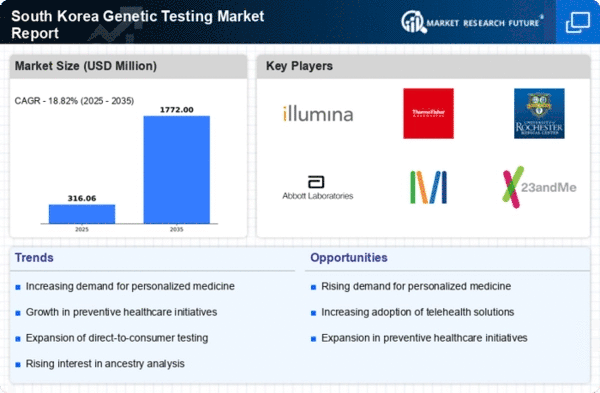Increased Awareness and Education
Awareness and education regarding genetic testing are crucial drivers for the genetic testing market in South Korea. As healthcare professionals and organizations promote the benefits of genetic testing, public understanding of its applications continues to expand. Educational campaigns focusing on the importance of genetic testing for disease prevention and management are gaining traction. In 2025, it is estimated that around 40% of the population will have a basic understanding of genetic testing, compared to just 20% in previous years. This heightened awareness is likely to lead to increased demand for genetic tests, as individuals seek to leverage genetic information for informed health decisions. The genetic testing market is thus benefiting from a more informed consumer base, which is essential for its sustained growth.
Rising Demand for Preventive Healthcare
The genetic testing market in South Korea is experiencing a notable surge in demand for preventive healthcare solutions. As individuals become increasingly health-conscious, there is a growing inclination towards proactive measures to identify potential health risks. This trend is reflected in the rising number of genetic tests being utilized for early detection of hereditary conditions. In 2025, the market is projected to reach approximately $500 million, driven by the desire for personalized health insights. The integration of genetic testing into routine health check-ups is likely to enhance patient engagement and adherence to preventive strategies, thereby fostering a more informed population regarding their health. This shift towards preventive healthcare is a pivotal driver for the genetic testing market, as it aligns with broader public health initiatives aimed at reducing the burden of chronic diseases.
Technological Advancements in Testing Methods
Technological innovations are significantly transforming the genetic testing market in South Korea. The advent of next-generation sequencing (NGS) and CRISPR technology has revolutionized the accuracy and efficiency of genetic tests. These advancements enable the analysis of vast amounts of genetic data at a fraction of the cost and time compared to traditional methods. As of 2025, the market is expected to grow at a CAGR of 15%, largely attributed to these technological breakthroughs. Enhanced testing capabilities not only improve diagnostic precision but also expand the range of conditions that can be tested. Consequently, the genetic testing market is poised for substantial growth as healthcare providers increasingly adopt these advanced methodologies to offer comprehensive genetic insights to patients.
Supportive Government Policies and Initiatives
Government policies and initiatives play a pivotal role in shaping the genetic testing market in South Korea. The government has been actively promoting genetic research and testing through funding and regulatory support. Initiatives aimed at integrating genetic testing into public health programs are being implemented, which could enhance accessibility and affordability for the general population. In 2025, government funding for genetic research is projected to exceed $100 million, reflecting a commitment to advancing healthcare through genetic insights. Such supportive measures are likely to foster innovation and encourage the development of new testing technologies, thereby propelling the growth of the genetic testing market. The alignment of public health objectives with genetic testing initiatives is expected to create a conducive environment for market expansion.
Growing Interest in Ancestry and Genetic Heritage
The genetic testing market in South Korea is witnessing a growing interest in ancestry and genetic heritage testing. Individuals are increasingly curious about their genetic backgrounds and familial connections, leading to a rise in demand for tests that provide insights into ancestry. This trend is particularly pronounced among younger generations, who are more inclined to explore their heritage through genetic testing. By 2025, it is anticipated that the ancestry testing segment will account for approximately 25% of the overall genetic testing market. This burgeoning interest not only drives sales but also encourages individuals to engage with their genetic information in a meaningful way. The genetic testing market is thus benefiting from this cultural shift towards understanding one's roots, which complements the more traditional health-focused applications of genetic testing.
















